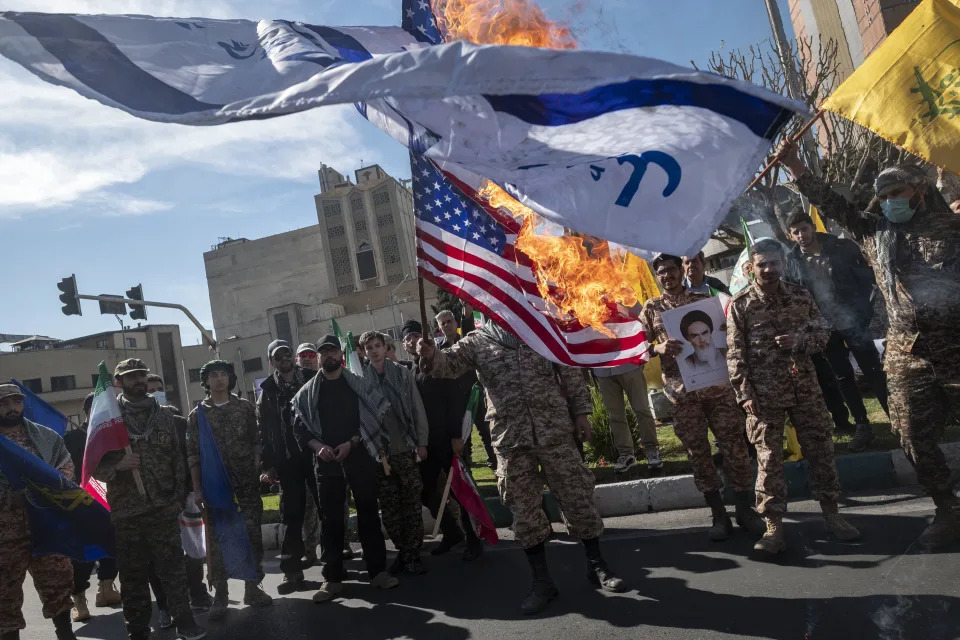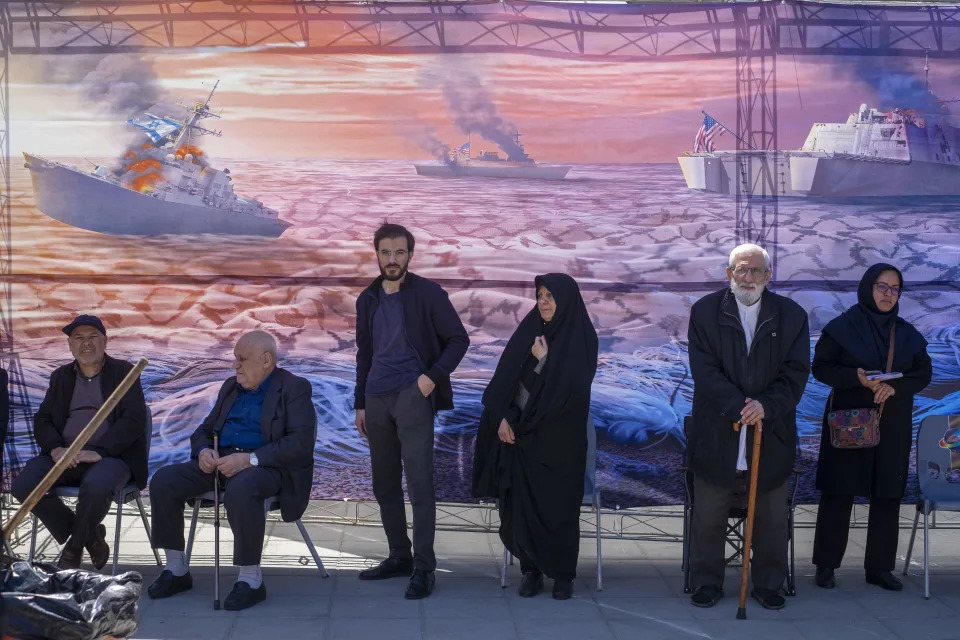U.S. issues travel warning for Israel as Iran expected to attack any time

Israel is bracing for a worst-case scenario that U.S. officials believe could materialize within just hours — the possibility of a direct attack on Israeli soil by Iran in retaliation for a strike almost two weeks ago that killed seven Iranian military officers. Iran has vowed to take revenge for Israel killing its commanders, who were hit by an April 1 strike on the Iranian embassy in Syria's capital.
Two U.S. officials told CBS News that a major Iranian attack against Israel was expected as soon as Friday, possibly to include more than 100 drones and dozens of missiles aimed at military targets inside the country. Sources have told CBS News the retaliation could include attacks carried out both by Iranian forces, and proxy groups around the region that it has been funnelling additional arms to for weeks.
The officials said it would be challenging for the Israelis to defend against an attack of that magnitude, and while they held out the possibility that the Iranians could opt for a smaller-scale attack to avoid a dramatic escalation, their retaliation was believed to be imminent.
Asked Friday how imminent he believes an attack is, President Biden responded, "I don't want to get into secure information, but my expectation is sooner than later." The president urged Iran not to move forward, saying his message to Tehran was: "Don't."
Tehran has not indicated publicly how or when it will return fire, so it's unclear how far Iran's leaders will go. If they decide to carry out a direct attack on Israel, there's fear it could blow Israel's ongoing war against Iranian ally Hamas up into a much wider regional conflict.
With the Iranian retaliation expected at any time, the U.S. State Department on Thursday warned Americans in Israel not to travel outside major cities, which are better protected from incoming rocket fire by the country's Iron Dome missile defense system. The latest guidance noted that travel by U.S. government employees in Israel could be further restricted with little notice as things develop in the tinderbox region.
"Whoever harms us, we will harm them," Prime Minister Benjamin Netanyahu vowed Thursday as he visited troops at an Israel Defense Forces airbase. "We are prepared … both defensively and offensively."

Sima Shine, a security expert and former official with Israel's national intelligence agency Mossad, told CBS News it was a dangerous moment for the region, and the "most worried" she has been. She said anxiety over an all-out war was likely just as high "on both sides, in Israel and in Iran."
If Iran does choose to strike Israel directly, it could involve a complex missile and drone attack similar to the one Iranian forces launched against a Saudi oil facility in 2019.
"They will try to do it on the military or some military asset," Shine predicted. "But the question will be the damage. If there would be many injured people, killed or injured … I think it has the potential for a huge escalation."

Shine stressed, however, that she still believes neither side actually wants a regional conflict.
U.S. "really trying to avoid war"
The U.S. sent a senior general to Israel this week to coordinate with the close American ally on any response it might make to an Iranian attack. Speaking Friday on "CBS Mornings," America's top military officer said, "we're really trying to avoid war."
"This is part of the dialogue that I have with my counterparts within the region, to include the Israeli chief of defense, who I talked to yesterday," said Joint Chiefs chairman Gen. Charles Q. Brown, Jr., adding that the U.S. military was "doing things not only to prevent a war, but at the same time, one of my primary things is to make sure all the forces in the region are protected."
"My role, as the chairman of the Joint Chiefs, is to plan and prepare," Brown said. "That's one thing we do very well."
Brown's Israeli counterpart, Chief of the General Staff Lt. Gen. Herzi Halevi, "completed a comprehensive situational assessment on the readiness of the IDF for all scenarios," Israel's military said Friday.
"The IDF is very strongly prepared, both offensively and defensively, against any threat," Halevi was quoted as saying in the statement. "The IDF continues to monitor closely what is happening in Iran and different arenas, constantly preparing to deal with existing and potential threats in coordination with the United States Armed Forces."
The IDF said the visiting U.S. general, Central Command chief Gen. Michael Erik Kurilla, was taking part in the IDF's situational assessment.
The dilemma for Iran, said Israeli expert Shine, is to figure out how to deliver its promised response to Israel's attack in Syria, but in a way that does not lead to further escalation. Likewise, Shine said Israel could choose to show restraint when it responds to whatever Iran eventually does.
If either side gets the balance wrong, the consequences for the region, and even the world, could be dire.
Iran doesn't want to get into a full-on war, but that won't stop it threatening one
-
Israel and the US expect a potential Iranian attack following a strike on Iran's embassy in Syria.
-
The incident has escalated the long-standing proxy war between Israel and Iran.
-
Despite threats of a direct attack on Israel, Iran won't want a war involving the US.
Both Israel and the US are on edge about a potential Iranian attack on Israel, but it's unlikely that threats from Iran's leader will live up to the rhetoric.
Earlier this month, a strike on Iran's embassy in Damascus resulted in the death of a senior figure in the al-Quds force of the Islamic Revolution Guard Corps, alongside six other Iranian military officers.
Israel has not publicly acknowledged responsibility for the strike, but Iran is clearly holding it accountable.
Iran's Supreme Leader, Ayatollah Ali Khamenei, said this week that Israel "must be punished and it shall be."
Khamenei's declaration that Israel should be punished, along with his saying that an "evil regime made a mistake," hinted at a raising of tensions between the countries.
A long-standing proxy war
The airstrike on April 1 marked an escalation in the long-standing proxy war between Israel and Iran.
Iran has supported anti-Israel militant groups such as Hamas in Gaza and Hezbollah militants in Lebanon, while Israel has conducted strikes against Iranian allies in Syria.
Israel views Iran as an existential threat, having long sought to prevent the country from building a nuclear arsenal. Iran has previously vowed to wipe Israel off the map.
The Iran embassy incident intensified those historic tensions to a fever pitch.
Indeed, The Wall Street Journal reported earlier this week that US intelligence reports suggested an attack was coming soon.
Yet such a move would risk causing a full-out war.
The Journal said that it was unclear if Iran intended to launch missiles onto Israeli soil or use regional proxies like Hezbollah or the Houthis in Yemen.
On Thursday, it reported that Israel was preparing for a direct attack by Iran within 48 hours.
If ballistic missiles or drones do target Israel, Israel would respond, and the US has made it clear it would support it. President Joe Biden vowed "ironclad" support for Israel, emphasizing the US commitment to Israel's security.
Israeli Prime Minister Benjamin Netanyahu said on Thursday that his country was ready to respond directly to any attack.
"Whoever harms us, we will harm them," he said. "We are prepared to meet all of the security needs of the State of Israel, both defensively and offensively."
By late Thursday, it appeared that Iranian officials were toning down some of their rhetoric.
According to Axios, Iranian Foreign Minister Hossein Amir-Abdollahian told Germany's foreign minister that Iran would respond in an "appropriate," albeit limited, way.
Reuters also reported that Iran had signaled to Washington that it wanted to act in a way that would avoid a major escalation.
Iran is facing a dilemma: It needs to maintain credibility while also exercising restraint to avoid drawing it into a conflict with the US that it would likely lose.
In the past, Tehran-backed militants have targeted US forces in response to Israel's actions, as Business Insider's Jake Epstein noted.
But experts on the region don't believe that it is prepared to go a step further, by sending rockets and drones to attack Israeli soil.
Iran has other worries, too. There's hyperinflation in the country, civil unrest, and a military that the Atlantic Council noted is not truly competitive with Israel, especially with its US backing.
"It doesn't possess the necessary power, willingness, and ability to engage in a conflict with the potential to escalate into a full-scale regional war with Israel,'" wrote Middle East analyst Saeid Jafari in an article for the Atlantic Council.
Ali Sadrzadeh, an analyst on the region, echoed these points in an interview with BBC News. He said that "Iran is not capable of a big confrontation with Israel given its military capabilities and economic and political situation."
Sadrzadeh added: "But it will have to come up with a response for domestic consumption and to protect its reputation among its regional allies."
After the US killing of Iranian Major General Qassem Soleimani in January 2020, Khameini vowed "severe revenge." Iran's President Hassan Rouhani made a similar pledge.
But the actual response was missile attacks on two airfields in Iraq that were housing US troops, causing injuries but no fatalities.
Skirmishes like these, outside Israel and possibly in Lebanon, are plausible in relation to this latest incident. As history has shown, Iran may be prepared to flex its muscles, but it's unlikely to get into a fight it would probably lose.
- Questions and Answers
- Opinion
- Story/Motivational/Inspiring
- Technology
- Art
- Causes
- Crafts
- Dance
- Drinks
- Film/Movie
- Fitness
- Food
- Games
- Gardening
- Health
- Home
- Literature
- Music
- Networking
- Other
- Party
- Religion
- Shopping
- Sports
- Theater
- Wellness
- News
- Culture
- War machines and policy

